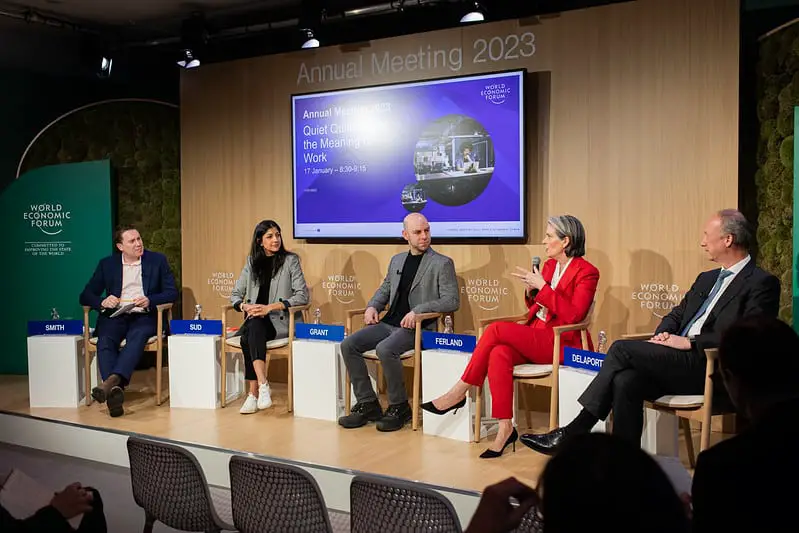A selection of panelists at the World Economic Forum, held in Davos, Switzerland, this week, discussed the best way to address the growing concerns around workers doing the bare minimum.
Key Details
- During a meeting of the World Economic Forum, leaders met to discuss how to combat “quiet quitting” and how the work environment is shifting and how companies can develop and retain talented employees.
- The panelists included Vimeo CEO Anjali Sud, Mercer CEO Martine Ferland, Saul P. Steinberg Professor of Management and Psychology Adam Grant, Wipro Limited CEO Thierry Delaporte, and moderation from Semafor Editor-in-Chief Ben Smith.
- During the discussion, panelists concluded that to retain their workforce, companies should learn to develop and retain talent, create a sense of purpose, use digital tools to connect, and learn what employee goals are.
Why it’s important
A trend known as “quiet quitting” began on TikTok, where users encouraged one another to only go above and beyond in the workplace if compensated appropriately.
This trend accompanied the Great Resignation, leaving employers scrambling to either adapt to a new work environment or convince younger employees to participate in the previous one.
As leaders seek to reach younger employees, there needs to be more clarity between what the younger generation expects from an employer and what the employer expects from his employee. If an employer cannot connect with the employee, Vimeo CEO Sud says that productivity will decrease in the company.
Sud encourages company leaders to connect with their employees and ensure that they use their skill sets in the right area of the company. The quiet quitting trend will continue if companies are unable to connect with employees and cultivate a sense of purpose.
Delaporte suggests that cultivating the proper company culture will help in giving employees a sense of purpose that will encourage them to stick with a company. Leaders will need to learn how best to adjust to the changing labor market, and giving employees that purpose is just one way to do so.
“What employees are looking for, candidates when they join a company, they want to join a company that has a culture. They want to feel part of the culture. They want to embrace the culture. A sense of purpose … is incredibly important. Why am I doing this?” Delaporte says.
Ferland suggests that companies should use technology to better connect with their employees. As an example, Ferland shared how his company Mercer will style its company town hall meetings like a TV show, allowing employees to watch the town hall at their leisure.
By putting a twist on a classic interview method, Grant thinks companies can avoid a repeat of the Great Resignation. Grant suggests that companies should perform entry interviews—similar to exit interviews.
When an employee leaves the company, employers often perform an exit interview to learn what the company can improve upon. Grant suggests that entry interviews can be preliminary interviews to determine an employee’s future goals and plans and how the company can help the employee achieve those goals.
